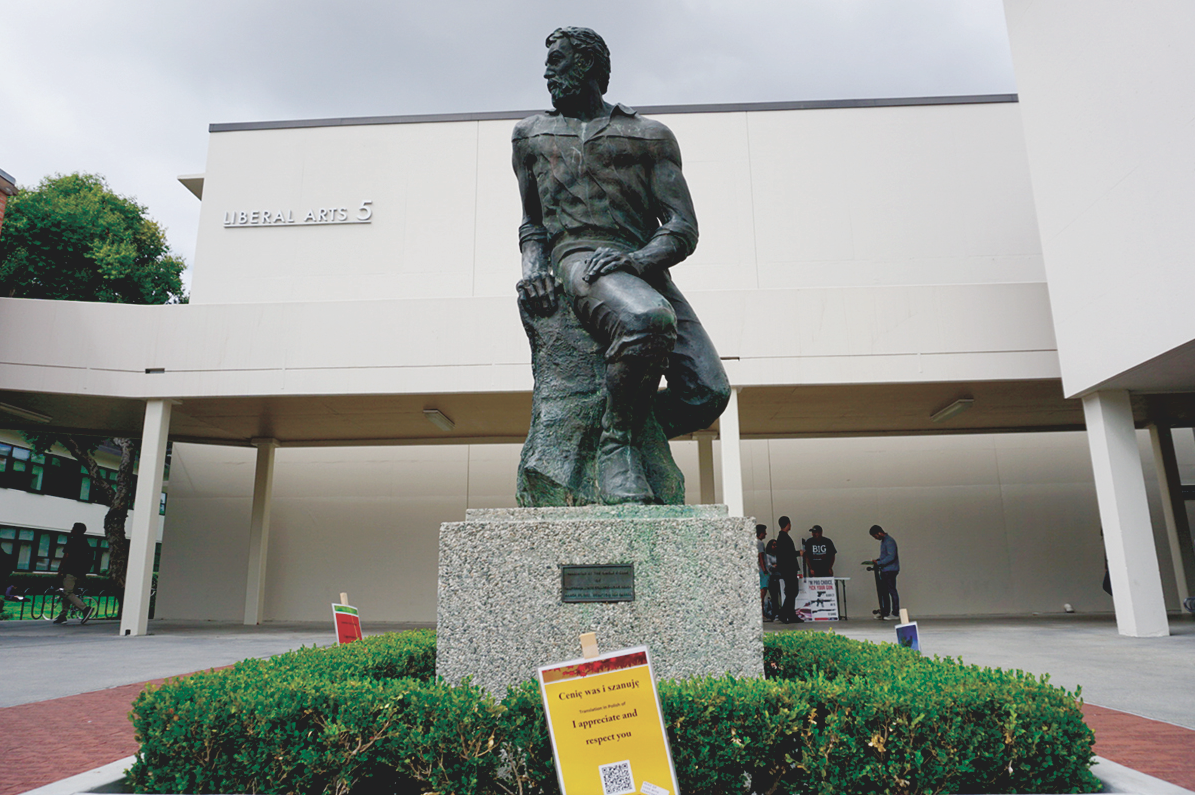On the walls of Liberal Arts 5, yellow posters pile up like tiles a few feet behind Prospector Pete. The famous 49er mascot, which has recently been a topic of contention among members of the campus community, was eclipsed by the colorful pieces of paper that read “I appreciate and respect you.”
Last Thursday, Cal State Long Beach launched a linguistic landscaping project featuring the title of the campaign written on posters in different languages. According to an email by the Provost Brian Jersky, the campaign will continue over the course of the year and will travel around campus. Viewers who capture the QR codes on their smartphones will be led to audio or video files of the speaker or signer on the poster.
The campaign was devised by Craig Stone, director of the American Indian studies program, and Alexandra Jaffe, chair of the linguistics department. According to the CSULB department of linguistics website, the goal of the project is to “make all members of the community feel appreciated and respected.” The project coordinators currently serve as members of President Conoley’s Inclusive Excellence Commission, a group that aims on eliminating barriers to success and plans against systemic difficulties that affect diverse community members.
The placement of the posters is part of a new plan to redesign the plaza where Prospector Pete stands to present the complex histories of California. The tension associated with the statue dates back to the ‘70s, but the idea of the mascot being a figure of “genocide” has recently sparked debate. Stone said the message and location of the campaign signs would be used to generate empathy for all members of the campus community.
“We also understood that the placement of the signs could be seen as an ironic gesture to anyone knowing of the ongoing history of engagement with the statue,” Stone said.
The project came to fruition after three observations, according to Stone. The first involved the importance of language retention among indigenous communities as native languages are becoming taught less often. Judge Deborah Sanchez, AIS faculty member and Los Angeles superior court judge, created a sound file of the eponymous campaign words in a dialect of the Chumash language. Stone also found that the ethnic studies faculty reported “they did not feel respected or appreciated on their campuses.”
Both realizations alongside the recent nazi flyers plastered on the multicultural center two weeks ago sparked Stone and participating members’ desire to “visually cleanse or smudge” postered areas.
“I Appreciate and Respect You” is associated with the Puvungna Arts Empathy Production Project, which uses art to promote empathy for different groups. Puvungna is the land that CSULB was built upon, and once hosted the American Indian Tongva tribe for centuries prior to colonization.
The goal of the project is to document diversity at CSULB through recording all languages and dialect spoken or signed on campus.
“In our on-going linguistic landscape project, people tell their own stories about themselves and speak of the languages and cultures that they value,” Stone said. “[This is] something that we need more of in public space.”
Linguistic landscaping is the prominence of languages usually on visible signs in a public area and its effect on cultural climate.
Luke Beller, a first year masters student in linguistics, said he liked the idea of the campaign presenting different languages.
“I think it’s good, especially that it’s in different languages,” Beller said. “It’s kind of showing CSULB’s idea of inclusion and everyone should be a part of everything that happens here.”
Some students view the landscaping project as a way to counteract hate speech happening on campus.
Samantha Shinn, a senior sociology student, praised the campaign’s diversity and emphasized the need for students to come together.
“We are filled with students coming from different backgrounds,” Shinn said. “[This campaign] displays how much we stand by each other because … we are people who may or may not suffer from being a minority. In the end, we should all stand together because we don’t know who will get targeted next.”
Senior Jiayu Tan, an Asian American studies student, echoed a similar sense of connectedness.
“With all the hate speech going on, I believe this campaign can bring people together,” Tan said. “Everyone is the same, we just speak different languages. We should be more open-minded to new ideas and other cultures.”
Stone encouraged students to visit the linguistic department’s website to gain more knowledge on how to get involved with the campaign.
“The people who stopped by and participated thanked us for doing the project so we are encouraged by their response,” Stone said.
The project will continue over the course of the academic year and its organizers hope to expand the project across campus with posters in dorms and building hallways.




